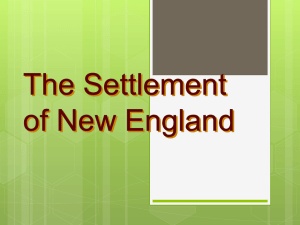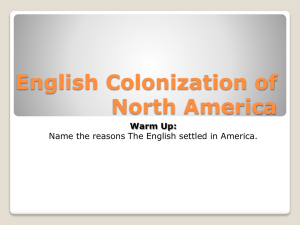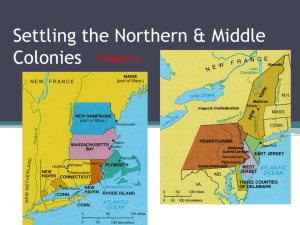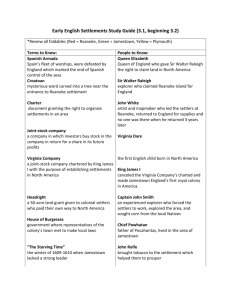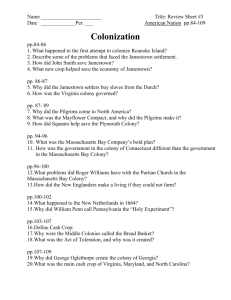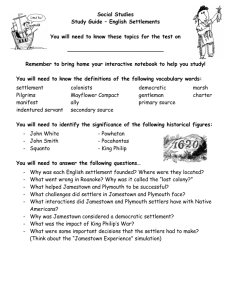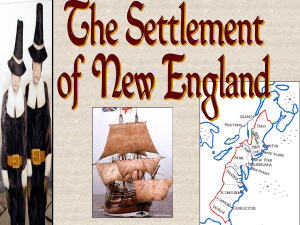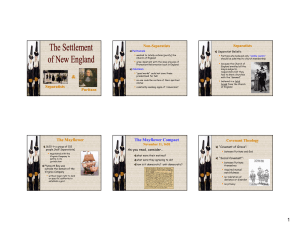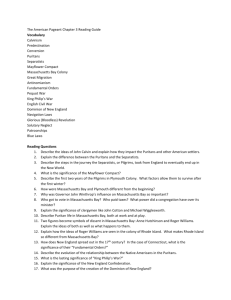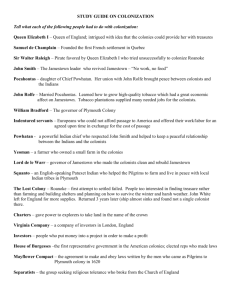Plymouth and Mass. Bay
advertisement
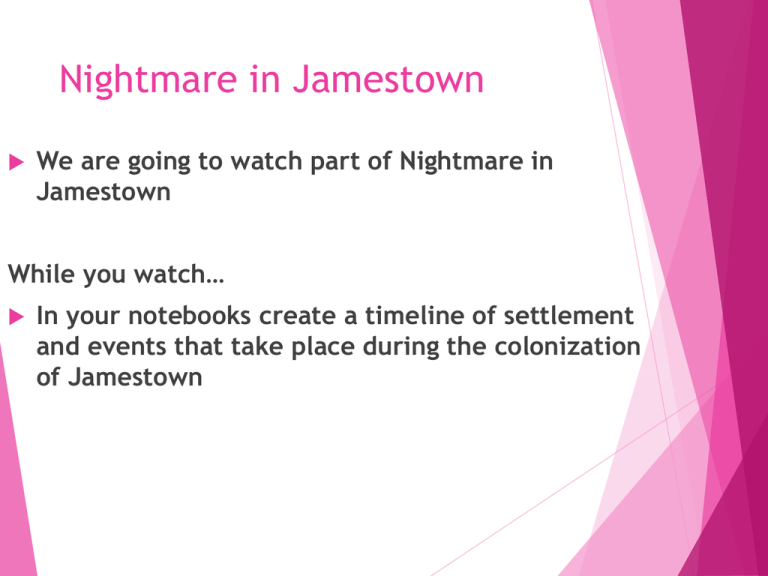
Nightmare in Jamestown We are going to watch part of Nightmare in Jamestown While you watch… In your notebooks create a timeline of settlement and events that take place during the colonization of Jamestown Happy Wednesday! 1. The primary motivation for the colonization of Jamestown was: a. to find a warmer climate b. to seek peace c. the promise of wealth d. to experience other cultures 2. ________________ became famous for his statement that “he that will not work shall not eat.” 3. Why did they choose the location for Jamestown? 4. Illustrate two of the hardships faced at Jamestown. We are going to play KAHOOT review of Jamestown! Pilgrims (Separatists) vs. Puritans Puritanism Calvinism : “Institutes of the Christian Religion” Predestination: Good works could not save those predestined for hell No one could be certain of their spiritual status. Gnawing doubts led to constantly seeking signs of “conversion.” Puritans: Want to totally reform [purify] the Church of England. Grew impatient with the slow process of Protestant Reformation back in England. Separatists (Pilgrims) Believed only “visible saints” [those who could demonstrate in front of their fellow Puritans their elect status] should be admitted to church membership. Because the Church of England enrolled all the king’s subjects, Separatists felt they had to share churches with the “damned.” Therefore, they believed in a total break from the Church of England. The Mayflower 1620 -> a group of 102 people [half Separatists] Negotiated with the Virginia Company to settle in its jurisdiction. Plymouth Bay was outside the domain of the Virginia Company. Became squatters without legal right to land & specific authority to establish government Mayflower Compact (1620) Signed by 41 members before landing at Plymouth Let’s examine! Plymouth Winter of 1620-1621 Only 44 out of the original 102 survived. None chose to leave in 1621 when the Mayflower sailed back. Fall of 1621 -> First “Thanksgiving.” Colony survived with fur [especially beaver], fish, and lumber. Plymouth stayed small and economically unimportant. 1691: only 7,000 people Merged with Massachusetts Bay Colony. Covenants “Covenant between “Social of Grace”: Puritan communities and God. Covenant”: Between members of Puritan communities with each other. Required mutual watchfulness. No toleration of deviance or disorder. No privacy. William Bradford Self-taught scholar. Chosen governor of Plymouth 30 times in yearly elections. Worried about settlements of non-Puritans springing up nearby and corrupting Puritan society. Massachusetts Bay Colony 1629: Puritans got a royal charter to form the MA Bay Co. Wanted to escape attacks by conservatives in the Church of England. They didn’t want to leave the Church, just its “impurities.” 1630 :1,000 people set off in 11 well-stocked ships Established a colony with Boston as its hub. “Great Migration” of the 1630s Turmoil in England [leading to the English Civil War] sent about 40,000 to Massachusetts Bay John Winthrop Well-off attorney and manor lord in England. A Model of Christian Charity. 1st governor of Massachusetts. Believed that he had a “calling” from God to lead there. Served as governor or deputy-governor for 19 years. Characteristics of NE Colonies Low mortality: average life expectancy was 70 years of age. Many extended families. PATRIARCHY: males were the head of house and all churches/business Average 6 children per family. Average age at marriage: Women – 22 years old Men – 27 years old. Using evidence from Document A and Document B, answer the question below: Were the Puritans selfish or selfless? Quiz Friday Causes for Exploration/Key explorers Effects of exploration Roanoke Jamestown, NE Colonies Mini-Project Due September 8 (Tuesday) Powerpoint or Pre-Recorded Video Economy Religion Culture Geography History
